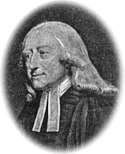- Wesley Covenant Prayer
-
Part of a series on
Methodism
John Wesley Background Doctrines Key people - John Wesley
- Richard Allen
- Francis Asbury
- Thomas Coke
- William Law
- William Williams Pantycelyn
- Howell Harris
- Albert Outler
- James Varick
- Charles Wesley
- George Whitefield
- Countess of Huntingdon
- Bishops · Theologians
Largest groups Related groups Other topics - Connexionalism
- Saints in Methodism
- Homosexuality and Methodism
Methodism portal Wesley's Covenant Prayer or A Covenant Prayer in the Wesleyan Tradition is a prayer adapted by John Wesley, the founder of Methodism, for use in services for the Renewal of the believer's Covenant with God. In his Short history of the people called Methodists (1781), Wesley describes the first covenant service; a similar account is to be found in his Journal of the time. Wesley says that the first service was held on Monday 11 August 1755, at the French church at Spitalfields in London, with 1800 people present. He reports that he "recited the tenor of the covenant proposed, in the words of that blessed man, Richard Alleine". The words of that original covenant prayer are lost, but are thought to be reflected in the Directions for Renewing our Covenant with God which Wesley issued as a pamphlet in 1780. Services using the Covenant prayer have been included in most Methodist books of liturgy since, though none was included in the Sunday Service of the Methodists in North America book that Wesley published in 1784 for the use of his followers in America. Perhaps for this reason, while the Covenant service has been an invariable part of the liturgy of the British Methodist Church and its daughter churches in the Commonwealth, its use is less widespread in American Methodist denominations: Referring to the United Methodist Church, Hohenstein (1997) notes that "covenant services are seldom encountered these days", though some American Methodist congregations do use the covenant regularly. The covenant prayer and service are recognised as one of the most distinctive contributions of Methodism to the liturgy of the church in general, and they are also used from time to time by other denominations.
Although Wesley's early covenant services were not held at any particular time of year, in British Methodism the custom soon developed of holding Covenant services near the beginning of the New Year, nowadays usually on the first or second Sunday of the year. This was perhaps under the influence of a different Methodist tradition, the holding of "Watchnight" services on New Year's Eve, in competition with the rowdy secular celebrations of the new year.
The origins of the covenant prayer have been the subject of some scholarly discussion (see Parkes, 1997). While Wesley attributes it to the English puritan Alleine, influences of German pietistic have also been claimed, and also (less frequently) echoes of the high church tradition from which Wesley sprang.
The form of the covenant prayer and service have been simplified since Wesley's time, but important elements of them are still retained from Wesley's Directions. They include many of the words both of the bidding that traditionally precedes the prayer, and the prayer itself. The bidding traditionally includes phrasing such as:
- ...Christ has many services to be done. Some are easy, others are difficult. Some bring honour, others bring reproach. Some are suitable to our natural inclinations and temporal interests, others are contrary to both... Yet the power to do all these things is given to us in Christ, who strengthens us.
In the early 1960s, at the national Methodist Student Movement convention in Champaign-Urbana, IL, the covenant had been scored for chorus and musicians and was sung as a whole by the thousands of students attending.
The Prayer
- I am no longer my own, but thine.
- Put me to what thou wilt, rank me with whom thou wilt.
- Put me to doing, put me to suffering.
- Let me be employed for thee or laid aside for thee,
- exalted for thee or brought low for thee.
- Let me be full, let me be empty.
- Let me have all things, let me have nothing.
- I freely and heartily yield all things to thy pleasure and disposal.
- And now, O glorious and blessed God, Father, Son and Holy Spirit,
- thou art mine, and I am thine.
- So be it.
- And the covenant which I have made on earth,
- let it be ratified in heaven.
- Amen.
(as used in the Book of Offices of the British Methodist Church, 1936).
External links
- Complete works of John Wesley, Vol. 2, comprising his Journal for the years 1745-1760, including the entries describing his first covenant service
- Complete works of John Wesley, Vol. 13, including the extract from the Short history of the people called Methodists describing Wesley's first covenant service.
- Facsimile of Wesley's Directions for Renewing our Covenant with God, 3rd edition (1784).
- Hohenstein, C. R., (1997). "Lex orandi, lex credendi": Cautionary notes. Wesleyan Theological Journal, 32(2).
- Parkes, W. (1997). Watchnight, Covenant Service, and the Love-Feast in Early British Methodism. Wesleyan Theological Journal, 32(2).
Categories:- Christian prayer
- Methodism
- 18th-century Christian texts
Wikimedia Foundation. 2010.
